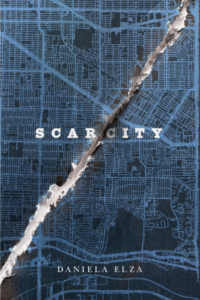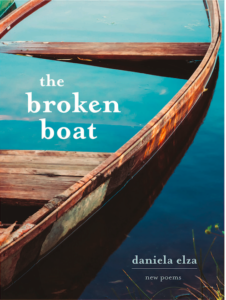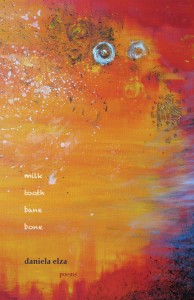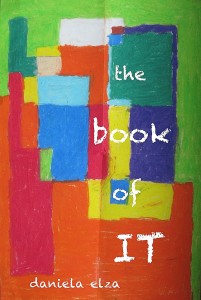:introducing some chaos:
Posted by Daniela Elza on Jun 14 2009
This was my first time at the League of Canadian Poets (LCP) Poetry Festival and Conference. I enjoyed the readings. I had fun reading at the different events.
On Thursday night I was excited to launch some of the collabrated work I have done with Harold Rhenisch and Rob Taylor.
On Friday night at the Cafe Deux Soleils I read to an awesome crowd. One of the new members did not show up for the reading, so the moderator said he will introduce some chaos: at the end had about seven or eight of us come up on stage with one poem each, and asked us to read our poems at the same time on the four mics. So we did. It was crazy, really. Half way through, as some of the poets dropped out, I started hearing the others and started pausing and playing. I was beginning to have fun with it. I can see how this can work with some tinkering.
It was good to attend some of the panels. These ones worked for me:
- “Working Class Heroes—work poetry and why it matters“.
One thing that came up and I thought was a necessary thing to talk about is how the poet who writes about work is never sure how his peers will take that. It is like we lead these dual lives until the book is published and we are faced with how public this other sided of your life becomes. To the surprise of the writers who spoke their colleagues were proud of them. Honoured that someone would write about what it is to be a builder, or carpenter, or a doctor. What greater reward than that? And always that interesting question: what we define as work in our society. - Who is In, Who is Out? The Anthology.
Funny, heartfelt, and honest. It turns out you cannot put an anthology together without pissing someone off. As Gary Geddes pointed out:You are at the risk of being accused of including your friends, or as an editor one should not have any friends, or possibly lose one’s friends in the process. Considering how the conversation about an anthology revolves around who is in, who is out especially in the reviews of such books, it makes one think: What do we want of anthologies? Are we too vain? I wrote a review of such a review in an earlier post, myself quite grieved at the opportunity reviewers miss to actually look at what they have in their hands. A review then ends up being an explicit statement of a reviewer’s own biases, blind spots, and unreasonable expectations. Pity to subject the book to these, rather than actually trying to see what the book set out to achieve and evaluate, and if it has done it well.
I personally am interested in the community aspect of such endeavours. Poetry and poets are fractured and scattered. In such moments when an anthology is put together they are brought together into a community. Both the ones that I was in Rocksalt and A Verse Map of Vancouver were such occasions for me. To get in touch with younger and older poets who are alive and working in this field and start building connections. Not to mention the wider relevance to the communities we live in. So anthologies can be viewed as community building artifacts and events. And a kind of snapshot of a moment and a celebration. Do we compile anthologies to be read by other poets? Or do we intend for the anthology to reach a wider audience? And so on. A lot to discuss and to think about there. - Spoken Word:Deep Roots and Diverse Shoots.
I missed a bit of the beginning of this panel but soon after I came in one person left disgruntled. Hmmm. So, what is the big deal. There is a difference for me between reading a poem and inhabiting a poem. And the spoken word artists for me lean into the side of the inhabiting the words they speak. Embodying them. And carrying me along with them. Transfering that embodiment. I have suffered through a lot of readings of poems. And some very good poems, but the reading got in the way.
So we have a lot to learn from each other. Ultimately there is the text from which we all work from, and it connects us. And the poems on the page as well have their continuum of how much poetry they capture. So there are all these degrees of completions and inhabitions. And we try to classify them? And somewhere along the way we forget the passion.
We need to sustain the dialogue. And shed these artificial lines that someone comes and draws in the sand. Because the waves that lap from the ocean of poetry will keep smoothing them out. As Robert Bringhurst reminds us:“Professions become institutions, and institutions close their doors and windows, leaving poetry outside. … Outside—meaning outside human management—is the place where poetry lives.”
Today I have to gather myself, remember what it is I should be doing after this alternate reality of the League. Most conferences that last for a few days do that. There is a moment of oversaturation and then the re-membering of the parts that matter and nurture us.





